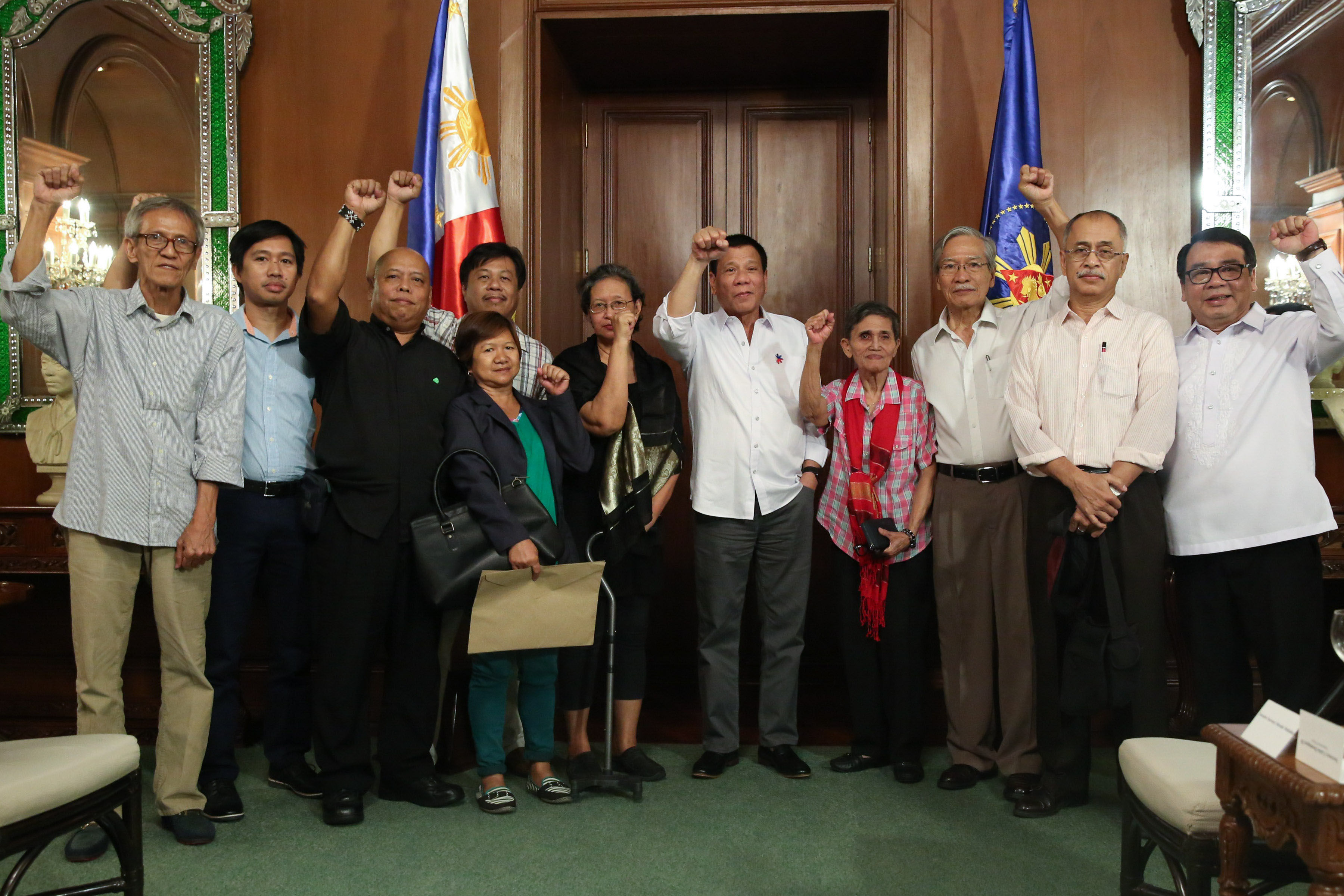More martial law victims slam OSG: Why block reparation claims?

THOSE WERE THE DAYS Members of Samahan ng Ex-detainees Laban sa Detensyon at Aresto, including former Bayan Muna representatives Neri Colmenares and Satur Ocampo (first and third from right) join President Duterte in Malacañang in January 2017. The group on Saturday hit the Duterte administration for rejecting the reparations deal due thousands of martial law victims. MALACAÑANG PHOTO
MANILA, Philippines — Another group of former political prisoners during the martial law regime of President Ferdinand Marcos has questioned the Office of the Solicitor General (OSG) for blocking what should have been the third payout of reparation claims granted human rights victims by a Hawaii District Court.
In a statement, Samahan ng Ex-Detainees Laban sa Detensyon at Aresto (Selda) described as “questionable” the motives of the OSG in refusing the settlement deal that would have distributed $13.75 million among 6,500 registered claimants in the class suit.
On Wednesday, the OSG, the Department of Justice and the Presidential Commission on Good Government (PCGG) said they had agreed on March 11 that the government would no longer enter into the settlement deal “in the best interest of the republic.”
The OSG, headed by Jose Calida, said it found the terms of the deal “grossly disadvantageous to the government and not in accord with existing Philippine laws and jurisprudence.”
Under the settlement agreement, the martial law victims would receive $13.75 million from the sale of four paintings illegally acquired by former first lady Imelda Marcos, with the government getting $4 million.
Article continues after this advertisementThe remainder would be split between Golden Buddha Corp. and the estate of Roger Roxas, who discovered the so-called Yamashita treasure.
Article continues after this advertisementDangerous precedent feared
“Is this mere legality or technicality that the OSG is raising to stop the claims distribution?” asked Selda vice chair, Danilo dela Fuente, who added that the move could set a dangerous precedent and may prevent other victims from seeking claims in the future.
“In the first place, the victims and the members of the class suit have a rightful claim to the settlement. They proved time and again that the late dictator [Marcos] and his family should be made accountable for decades of their rule. The [victims] have all the right to assert and demand justice and compensation,” Dela Fuente said.
Selda also questioned the motives of the Duterte administration that, the group said, seems to be rehabilitating the Marcos image by saying that no plunder occured during his regime.
Stopping the reparations and recognition of their claims may be “tantamount to nonacknowledgment of the victims of martial law,” Selda said.
On Saturday, Sen. Aquilino “Koko” Pimentel III said in a radio interview that he was willing to file a bill to allow the distribution of the proceeds from the sale of the paintings, if this would remedy the situation created by the OSG’s rejection of the settlement deal.
Pimentel, however, said he could not judge the fairness of the OSG’s move, as he had yet to read and study the reason behind it.
DOJ: Talk to Calida
Asked about the basis for the government’s rejection of the settlement agreement, Justice Secretary Menardo Guevara referred the Inquirer to Calida.
“The best person to ask is Solicitor General Calida because [the] OSG is advising the PCGG on these cases,” Guevarra said.
Calida had yet to respond to the Inquirer’s request for comment at press time.
Claimants 1081
On Friday, another group of rights victims, Claimants 1081, condemned the OSG’s position as “an attempt to muscle in on the matter of the settlement,” as it urged the government to “be consistent with its policy of support for compensation for the Marcos human rights victims.”
Claimants 1081 also reminded the government that the PCGG continued to have jurisdiction over the Marcos assets and their recovery, and pointed out that the OSG had failed in its attempt to either disband the PCGG or transfer the agency under its jurisdiction.
The PCGG is a quasijudicial agency created in 1986 by President Corazon Aquino to recover the ill-gotten wealth accumulated by the Marcos family and its cronies. —With a report from Jerome Aning